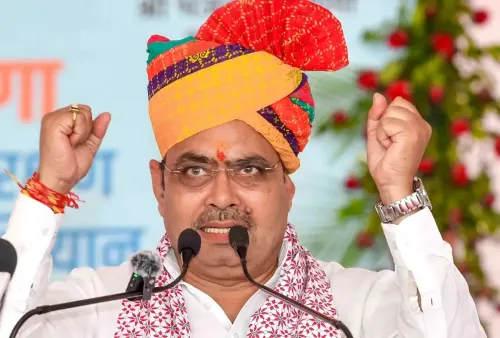Why Did Telangana Suspend the Tiger Conservation Reserve Order?

Synopsis
Key Takeaways
- The Telangana government has temporarily suspended the Kumram Bheem Tiger Conservation Reserve order.
- Protests by tribal communities highlighted concerns about displacement and forest rights.
- The decision affects over 330 villages in the region.
- Government officials conducted a thorough review before reaching this conclusion.
- Inclusivity in development is a priority for the Telangana government.
Hyderabad, July 21 (NationPress) Following significant protests from tribal communities across four districts in Telangana, the state's government has opted to temporarily suspend the creation of the Kumram Bheem Tiger Conservation Reserve.
Chief Minister A. Revanth Reddy made the determination to put Government Order (GO) 49 on hold pending further developments after receiving reports from three ministers.
Minister for Forest and Environment Konda Surekha noted that this decision was reached after thoroughly considering the concerns raised by tribal populations.
This decision coincided with a statewide bandh that lasted from dawn to dusk in Adilabad, Nirmal, Kumram Bheem Asifabad, and Mancherial districts, protesting against the government order.
Public transport was halted, and businesses, schools, cinemas, and fuel stations were closed in solidarity with the call from the tribal organization Tudum Debba.
Tribal groups have voiced their fears that the government seeks to exclude them from their ancestral forests.
On May 30, 2025, the state government had issued orders to designate the tiger corridor linking the Kawal Tiger Reserve in Telangana with the Tadoba-Andhari Tiger Reserve in Maharashtra as the Kumram Bheem Conservation Reserve, in accordance with the Wildlife Protection Act, 1972.
This government order aimed to convert 1.49 lakh hectares across various forest ranges, including Asifabad, Kerameri, Rebbena, Tiryani, Kagaznagar, Sirpur, Karjelli, Bejjur, and Penchikalpet, into the Kumram Bheem Tiger Conservation Reserve, as part of the expanded Kawal Tiger Corridor.
However, with over 330 villages potentially impacted, numerous tribal residents and local leaders expressed serious concerns about possible displacement and the infringement of their forest rights.
Konda Surekha, along with Adilabad District In-charge Minister Jupally Krishna Rao and Panchayat Raj Minister Seethakka, conducted an exhaustive review of the situation, submitting their findings and recommendations to the Chief Minister.
Following the Chief Minister’s directive, the Forest Department announced on Monday the suspension of the implementation of GO 49.
Minister Konda Surekha emphasized that the government is mindful of the concerns expressed by tribal communities and public representatives across various tribal regions.
"This government is committed to serving the people. We will never enact any decision that undermines the rights or livelihoods of Adivasis and tribal communities. The voices of local residents have been acknowledged, and appropriate actions have been taken. The welfare of every citizen, particularly our tribal brothers and sisters, is our utmost priority," she stated.
The Minister further affirmed that the Telangana government remains dedicated to fostering inclusive development, ensuring that conservation initiatives align with the rights and welfare of indigenous populations.










